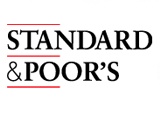|
|
TODAY.AZ / World news
S&P cuts Turkey rating outlook
02 May 2012 [11:33] - TODAY.AZ
 Standard & Poor's cut the outlook on Turkey's 'BB' sovereign credit rating to stable from positive on Tuesday, saying risks to its creditworthiness had risen as a result of its high debt and worsening terms of trade as demand for its exports weakens.
Standard & Poor's cut the outlook on Turkey's 'BB' sovereign credit rating to stable from positive on Tuesday, saying risks to its creditworthiness had risen as a result of its high debt and worsening terms of trade as demand for its exports weakens.Reuters news agency said, data on Tuesday showed Turkey's exports fell 2.9 percent year-on-year in April to $11.41 billion but were 5.9 percent higher, at $45.66 billion, in the first four months of the year.
"Less-buoyant external demand and worsening terms of trade have, in our view, made economic rebalancing more difficult, and have increased the risks to Turkey's creditworthiness given its high external debt and the state budget's reliance on indirect tax revenues," S&P said in a statement.
The terms of trade is the relative price of exports to imports.
It said Turkey's high current account deficit and net external debt in the financial sector, whose overseas borrowing stoked a credit boom and helped drive annual economic growth of around 8 percent in recent years, made it vulnerable to shocks.
The rating agency said it estimates that external financing needs will reach 142 percent of current account receipts in 2012, one of the highest levels for any rated sovereign.
"This heavy reliance on external savings exposes Turkey to shocks, either domestic - for example if recent high domestic credit growth were to result in future bad loans - or external, say if rising risk aversion were to deter foreign investors and banks and result in a net outflow of foreign capital," S&P said.
That could in turn cause rapid lira depreciation, fuelling already-high inflation and raising government borrowing costs, the agency added.
Turkey's current account deficit, which largely reflects its total dependence on energy imports, is seen as the booming economy's main weakness. The deficit stood at 10 percent of GDP in 2011 but is expected to decline to 8 percent this year.
Prime Minister Recep Tayyip Erdo?an last month announced a new tax incentive scheme aimed at reducing the gaping current account deficit by encouraging local production of some previously imported goods.
Turkish markets were closed for the May 1 holiday but the lira slipped 0.3 percent against the dollar in thin offshore trade following the ratings decision. The currency had hit two-month highs on Monday after the central bank adopted a more hawkish tone last week, signalling that it plans to keep a tight grip on inflation.
Turkish five-year credit default swaps were unchanged from earlier in the session at 230 basis points, according to Markit.
Murat Toprak, emerging markets strategist at HSBC, said the impact of S&P's move would be limited.
"S&P said the terms of trade has deteriorated, but everybody knows that," Toprak said.
Rival ratings agency Moody's Investors Service said at the end of March that Turkey's external and internal imbalances would weigh on its 'Ba2' rating, but kept its outlook positive.
Fitch rates Turkey a notch higher at 'BB+', one notch below investment grade.
Toprak said Turkey was unlikely to secure an investment grade rating while it maintains a large external deficit.
"It's not cyclical, it's structural and it needs time to be corrected," he said.
S&P said the stable outlook reflects its view that key risks to the Turkish economy will remain in balance in the next year, and said that its credit rating could improve if Turkey moves toward more balanced and sustainable growth.
/worldbulletin.net/
URL: http://www.today.az/news/regions/106371.html
 Print version
Print version
Views: 1335
Connect with us. Get latest news and updates.
See Also
- 12 February 2026 [23:33]
Georgia to restrict older car imports - 12 February 2026 [22:50]
Kahramanmara? rebuilds after earthquake of century - 12 February 2026 [22:23]
BMW announces global vehicle recall - 12 February 2026 [21:50]
Nurda?–Kahramanmara? high-speed rail link to boost regional trade - 12 February 2026 [20:40]
Russia takes steps to restrict WhatsApp access - 12 February 2026 [20:21]
T?KA-backed project establishes pediatric bone marrow transplant capacity in Mongolia - 12 February 2026 [19:45]
Samsung leads SK hynix in HBM4 deployment - 12 February 2026 [19:20]
Göbeklitepe exhibition opens in Berlin, showcasing 12,000-year-old neolithic treasures - 12 February 2026 [18:55]
South Korea’s spy agency says Kim Jong Un has chosen daughter as successor - 12 February 2026 [18:35]
Rodriguez: Maduro is Venezuela's 'legitimate president'
Most Popular
 United States takes over nuclear security of South Caucasus
United States takes over nuclear security of South Caucasus
 Baku and Washington have passed a verdict on the 907th Amendment
Baku and Washington have passed a verdict on the 907th Amendment
 G-77 and China Group hold plenary at UNESCO under Azerbaijan's chairmanship
G-77 and China Group hold plenary at UNESCO under Azerbaijan's chairmanship
 Defense concludes in Ruben Vardanyan trial, final verdict pending
Defense concludes in Ruben Vardanyan trial, final verdict pending
 Israel's Herzog hopes US talks can topple Iran's 'evil empire'
Israel's Herzog hopes US talks can topple Iran's 'evil empire'
 Reza Deghati's 'Rising Light' exhibition opens at Heydar Aliyev Int'l Airport
Reza Deghati's 'Rising Light' exhibition opens at Heydar Aliyev Int'l Airport
 Georgia targets completion of key transit highway linking Türkiye, Azerbaijan, and Armenia
Georgia targets completion of key transit highway linking Türkiye, Azerbaijan, and Armenia
